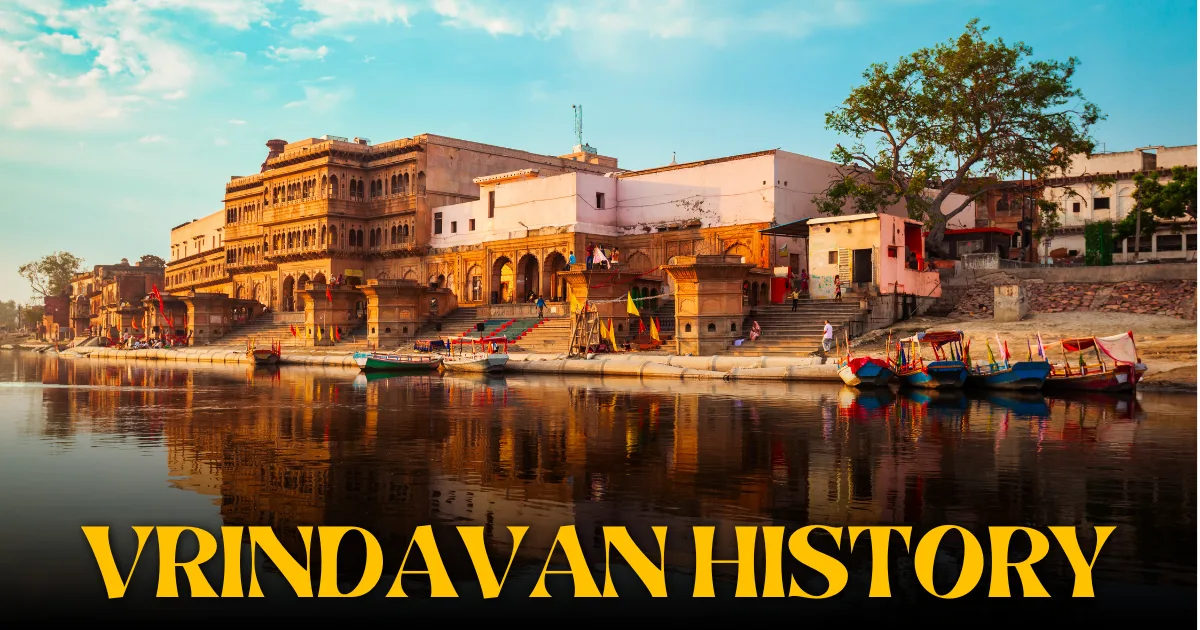As far as the question of Vrindavan History is concern, if you go deep into it, this is not merely the counting of dynasties and inscriptions, but such a saga in which Puranic tales, the sweet sounds of the Bhakti movement, and the faith soaked with the tears and laughter of countles devotees are intertwin together. Is it not surprising that while walking in the lanes of Mathura Vrindavan City, you feel as if history itself is whispering a mantra into your ears?
What does the Ancient History of Vrindavan Temples tell us?
If you look at the ancient history of Vrindavan temples, you will find that the foundation of these temples was not laid only on stones, but on the footprints of saints—on the sweetness of Surdas’s songs, on the stream of kirtan drench with the tears of Chaitanya Mahaprabhu, and on the offerings of those countless devote whose lamps removed darkness for ages. When the storms of the Mughal period tried to bring them down, even then these temples preserved their soul and later stood again, proving that faith lives not on stones but on resolve.
Why are the Mythological Stories of Vrindavan still alive?
Have you ever thought why even today an unspoken sweetness is filled in the groves and ghats of Vrindavan? The reason is that the mythological stories of Vrindavan are not merely tales, but the soul of this land. The Yamuna here is not merely a river, she is a witness of Krishna’s leelas; the trees are not merely trees, they are companions of that flute whose sound is still heard from some invisible direction. This is the very speciality of Mathura Vrindavan City, that even amidst the noise of modern life, these Puranic tales seem to breathe in every corner.
What is the Historical Significance of Vrindavan in Hinduism?
If you ask why the historical significance of Vrindavan in Hinduism is so important, then the answer will be that this land is the center of that tradition of devotion which bound the whole of India in one thread. The bhajans that arose from here resounded from Bengal to Gujarat; the stream of love that originated here broke the walls of caste and hierarchy. Even English travelers admitted that Vrindavan was not an ordinary town—this was the place where crowd and peace walked together, and where even in the commercial lanes the music of devotion never stopped. That is why even today Mathura Vrindavan City remains the heartbeat of the Bhakti tradition.
Today’s Vrindavan – The Union of Past and Present
Today when pilgrims arrive with modern means, when there are smartphones in their hands instead of letters, even then the soul of Vrindavan is unchang. The spires of temples have risen high, the ghats have become strong, the facilities in the ashrams have increased, but that eternal devotion is still flowing. Is this not the proof that Vrindavan History is not only the saga of the past, but a truth residing in the very breaths of the present? Mathura Vrindavan City is still that very bridge where past and present walk together.
Why should we remember and preserve?
Because in remembrance are our roots and in roots is our strength. When you walk in the lanes of Vrindavan, you are not only touching temples, but touching your own history. Heritage here is not a burden, it is a blessing. And this is the reason that Mathura Vrindavan City will continuously give us this message—that once faith is lit, it does not extinguish for ages, it become the lamp which show the way to generation.
FAQs of the Vrindavan History
1. What makes Vrindavan History unique in Mathura Vrindavan City?
Its confluence of mythology, devotion, and living heritage makes it unlike any other sacred place.
2. Which temples reflect the ancient history of Vrindavan temples?
Govind Dev, Radha Vallabh, Banke Bihari, and Madan Mohan temples stand as eternal witnesses of devotion.
3. Why are mythological stories of Vrindavan important?
Because they keep Krishna’s leelas alive, making every pilgrim feel connected with eternity.
4. What is the historical significance of Vrindavan in Hinduism?
It nurtured the Bhakti movement, inspiring saints, poets, and millions of devotees across India.
5. Does Mathura Vrindavan City still reflect its timeless essence?
Yes, even amidst modernization, the city continues to breathe the same devotion that has defined it for centuries.
